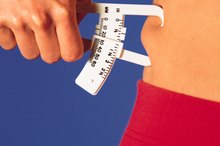Do Handheld Bodyfat Monitors Work?
Handheld body fat monitors measure body fat by a process called bioelectrical impedance analysis, or BIA. According to the American College of Sports Medicine, BIA measures body fat with the same accuracy as skin-fold calipers, trailing only hydrostatic weighing for accuracy. To achieve this level of accuracy, however, you need to follow strict protocol for use.
Function
BIA measures the electrical conductivity of your body. As you hold the device in both hands, an imperceptible electrical current passes through your body. Muscle tissue in your body contains a high percentage of water, while body fat contains virtually no water. Because water conducts electricity, the ease at which the current passes through your body determines your body fat percentage. Using equations and assumptions about average hydration and body water content, handheld BIA monitors display a body fat percentage to the user.
Considerations
The Water Displacement Test for Body Fat
Learn More
Handheld BIA devices do have a reported error between 3 and 5 percent for a variety of factors. Different genders, ages and races may have differences in body water content, thus decreasing the likelihood that one machine can deliver accurate results for everyone. Some devices do allow you to set age and gender, increasing the chances of an accurate measurement. Meal timing can also affect the results, as undigested food in the body can skew results. In addition, recent exercise can alter results as exercise alters body water content.
Method
To properly use the BIA device for the most accurate results, you must follow a strict protocol each time you get measured. You should use the same device for each measurement, and calibrate the device prior to each use. You must follow the same eating, drinking and exercising routine prior to measurement in order to ensure accurate results worthy of further analysis. Changes of 4 to 5 percent can occur from differences in hydration status alone, making consistency important. The same person should also administer the test each time, whether yourself or a clinician at a health club.
Interpretation
Healthy Body Fat Percentage Loss
Learn More
If you follow a strict protocol, the device displays an accurate body fat percentage, which you can further analyze. Your body fat percentage reflects the amount of your body composed of adipose tissue, also known as body fat. Subtract this percentage from 100, and you get your body's lean mass, that part composed of muscle, bone, water and other tissues. The higher the percentage of lean mass, the better. In general, ideal body fat percentage for a man falls below 22 percent, and for a woman below 30 percent, although age-based standards vary.
Related Articles
References
- ACSM’s Resource Manual for Guidelines for Exercise Testing and Prescription, 5th edition; Leonard A. Kaminsky
- ACSM’s Guidelines for Exercise Testing and Prescription, 7th edition; Mitchell H. Whaley
Writer Bio
Scotty Brunning is a Chicago-based health and fitness writer. Having worked with the Pittsburgh Pirates and the Cooper Fitness Center in Dallas, he has a plethora of fitness experience. He is an ACSM-certified health fitness specialist and a Cooper Institute master fitness specialist. Brunning holds a master's degree in health and fitness.








